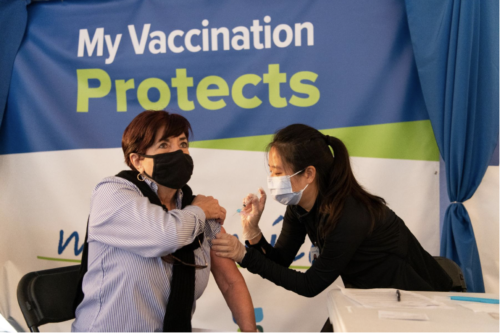Spending time outdoors is good for your health. Whether you’re heading out on the water, hiking up a local trail, or spending time with the family in the backyard, you’ll want to protect yourself and your family from bites and stings.
In honor of Summer Fun under the Sun Month at the Center for Health & Wellbeing (CHWB), our partners at AdventHealth provide these tips on avoiding the most common culprits, as well as advice on what to do if you get bitten or stung this summer.
Mosquitos
Mosquitos are a nuisance, and they love warm wet environments. Not only are their bites itchy, but they may also carry some of the Zika virus, which means it’s more important than ever before to protect you and your family from being bitten.
Prevention
To avoid becoming a mosquito meal, try to stay inside at dusk and dawn when they are most active. If you do venture outdoors, wear long sleeves and pants to protect your skin. Adults can also safely use insect repellent with DEET, but children under two months shouldn’t be exposed to the chemical.
What to Do If You Get a Bite
If you end up with an itchy bite, use an over the counter remedy to soothe the sensation and redness. Avoid scratching because it will inflame the bite, and could also trigger a skin infection.
Jellyfish Stings
Whether you live near the coast or are heading there for a beach vacation, you’ll want to stay mindful of aquatic life. Jellyfish stings are painful but often avoidable.
Prevention
Always check for marine warnings before you head in the water. A purple flag at the lifeguard station means that there’s something dangerous in the water, and you should check it out before heading in.
You’ll also want to keep an eye out for any jellyfish that wash up on shore and ensure that your kids stay away from them as they can still sting even when they’re not underwater.
What to Do If You Get Stung
If you have a jellyfish encounter, get to safety and then wash the area well with seawater. If there are any tentacles left behind, remove them and use gloves if you can.
Head to the lifeguard station to see if they have a vinegar solution. Pour this on your skin and leave it for around 30 minutes before rinsing. This will inactivate any stinging tentacles that might be left behind.
The swelling and redness should go away, but if it increases, seek medical attention.
Despite what you may have seen on tv or in the movies, don’t urinate on the sting. Not only will it not help, but it could also make the stinging worse.
Stingrays
Summer is stingray season, and if you head to the beach, that means it’s time to shuffle.
Prevention
Check for marine warnings before you enter the water. You may want to avoid heading in if it’s known that there are stingrays in the area. If you’re unsure, it’s still smart to do the “stingray shuffle” to avoid any accidents.
To do it, slow down your walk and shuffle your feet through the top layer of sand as you wade into the water. This will alert any stingrays who are buried under the sand in 10 or 12-inches of water. By shuffling, you send out vibrations that will scare them away and let you avoid stepping on one. That way, you won’t be subjected to catching one of the venomous barbs in their whip=like tails in the ankle, foot, or calf.
What to Do If You Get Stung
First, check to see if any of the barb is left behind. If not, soak the affected area in a bucket of hot water for about an hour. The hotter the temperature, the better as it will help to soothe the pain.
If there is anything left, it’s time to head to the ER. Don’t attempt to remove it yourself because you could cause more damage. You’ll also want to seek immediate medical attention if you experience any severe reactions after the sting, like a rash, vomiting, or trouble breathing..
Snake Bites
Although it’s just as likely that you’ll run across a harmless snake as it is that you’ll encounter a venomous one, it’s always good to use caution and know what to do if you’re bitten.
Prevention
If you see a snake, avoid it. Don’t try to catch, trap or kill it as that is when most people get bitten. Also, avoid tall grasses and piles of leaves were snakes may be resting or hiding. They are most active at night or in the early morning, so use extra caution if you’re outdoors during those times.
What to Do If You Get Bitten
If you can safely take a photo of the snake, try to do that immediately. If not, pay attention to it’s coloring and any patterns so that you can identify it if needed.
It’s normal to experience swelling if you’re bitten, so it’s also a good idea to remove jewelry around the area if you get a bite on your hand or arm.
Call 911 immediately or go to your nearest emergency room to get checked out.
Don’t bother with trying to suck venom from the bite wound- this is another myth that doesn’t actually work. Not only will it not stop the venom from spreading, but it could harm the person trying to
Ticks
Hiking trails are a common place to pick up ticks, and though most are benign, some are associated with certain diseases you’ll want to avoid, like Lyme disease.
Prevention
If you’re venturing out into a heavily wooded area, wear protective clothing like long sleeves, pants, tall socks, and boots. Tuck your pants into your socks to close any gaps, and use a lotion with DEET to repel ticks.
What to Do If You Get Bitten
Always inspect your skin when you get home to make sure you didn’t pick up any ticks. If you find one, remove it with sanitized tweezers and clean and disinfect the area.
Most ticks are harmless, but if you develop a rash that spreads or experience a fever or joint pain, head to the doctor right away.
Bees
Bees may be small, but they can pack a painful sting. Unless you’re experiencing an allergic reaction, there’s likely no reason to seek professional treatment.
Prevention
Bees don’t respond to insect repellant, so the only way to prevent a sting is to avoid bees. Give flowers a wide berth and keep an eye out for hives and avoid them.
What to Do If You Get Stung
If you’re stung, the bee will release the stinger into the skin, which you can remove gently by scraping or pulling it out. Applying ice to the area may help relieve the stings pain, and Benadryl may reduce itching. A mixture of baking soda and water can help remove the stinger.
Call 911 or go immediately to an emergency facility if there are signs of a bad allergic reaction, like trouble breathing, a rash over the entire body, swelling or vomiting. If you have had severe allergic reactions to insect bites or stings in the past, consider carrying an EpiPen (epinephrine auto-injector), which can be prescribed by your physician.






